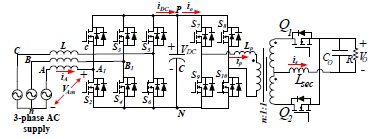- ALL COMPUTER, ELECTRONICS AND MECHANICAL COURSES AVAILABLE…. PROJECT GUIDANCE SINCE 2004. FOR FURTHER DETAILS CALL 9443117328


Projects > ELECTRICAL > 2017 > IEEE > POWER ELECTRONICS
This paper presents a methodology to control a two-staged AC/DC converter, which is a cascade combination of a three-phase AC-DC boost power factor correction (PFC) rectifier and a phase-shifted full bridge (PSFB) DC/DC converter. This manuscript explains the issues of instability and losing unity power factor operation i.e. high reactive power transfer with conventional PI compensator due to the sensitive variation of output impedance of the PFC stage at different loads. In our work, this instability issue is resolved by the proposed state-feedback control methodology, which shows that there exists a load-insensitive range of controller parameters, providing unity PFC. As an additional benefit of this control, total number of sensors are reduced by three (an input phase current, a DC/DC primary current and an output DC voltage), in comparison to the conventional PI-based control. This reduction is achieved by introducing two augmented state variables followed by their reduced state observer design.
Cascaded Three-Leg Converter.
In this paper, a new control methodology, incorporating reduced-state observer based state-feedback control for an integrated three-phase PFC and PSFB DC/DC converter is proposed and implemented. Its main objective is to ensure stability and achieve unity power factor at wide range of power levels upto 8kW. The reduced state observer design reduces the total sensor counts by three, as opposed to the seven required measurements in the conventional control with PI compensator. In order to address and alleviate the issues related to the instability of a cascaded two stage AC/DC converter, a reduced state observer based state-feedback control approach is proposed in this manuscript. The integrated PFC and PSFB topology can be structured as a three-phase PFC converter with a switching load, which represents the DC/DC stage. The input impedance of the DC/DC stage acts as the output load of the first stage. It is shown that the cascaded converter may lose its stability at some output load conditions with the conventional PI controller. The main reason for such instability is that the overall closed loop transfer function of three-phase PFC stage will inherently encounter right-half poles at particular load conditions. The proposed approach eliminates the occurrence of right half poles, as all the eigenvalues of the closed loop transfer function are inherently negative, irrespective of the feedback gain parameters. Furthermore, even though the converter is stable with the conventional PI control at some load conditions, the input power factor deviates from unity due to the imposed constraints on the PI parameters to ensure stability. Therefore, there will be reactive power transfer to the load side, resulting the efficiency degradation. The proposed control helps the converter achieve a unity power factor at all load powers, as the gain parameters are independent of load resistance. Another major contribution of this control is that it reduces three sensor counts (i.e. one input phase current, DC/DC primary current and final output voltage), whereas these measurements are definite requirements for the conventional PI control.
Basic structure of the integrated three-phase boost PFC and PSFB converter
